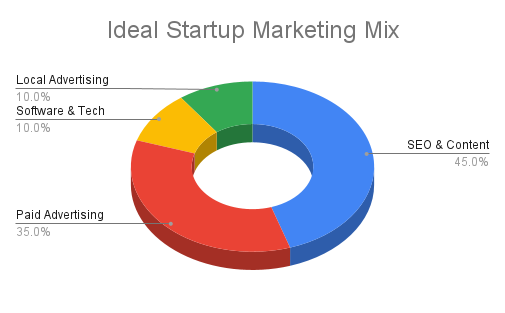Marketing an established business with years of data and a brand to back them is difficult, but to market a brand new business without brand recognition, historical data, and of course, customers is an even tougher battle. We put together this guide to help business owners and entrepreneurs navigate gaining visibility with their startup.
Where to Start?
I was talking to an entrepreneur this week who was really excited about his new venture, but quickly shifted his tone when he realized he had no idea where to start when it came to actually driving people to his practice. It’s a common feeling, and even the best marketers experience that when getting off the ground.
When launching a new business, marketing strategy should begin well before launch. The first step is to create a strategic marketing plan that identifies your target audience, establishes marketing objectives, outlines your positioning and messaging, and maps out a budget and tactics. This plan will evolve as you learn more about your customers and business, but it’s important to have a roadmap from day one.
Next, focus on brand building. Come up with a great business name, logo, and other brand assets to develop an identity. Build a professional website and create social media accounts to establish your online presence. Start developing messaging that provides value for potential customers. The goal in the beginning is to start increasing awareness and positioning yourself as a thought leader.
This brand building can even start with you! Get on Linkedin, and start posting thought-leadership material that engages your target audience. This strategy will help you begin to network before the real marketing even begins.
What Marketing Channels Should I Invest in?
The big question I get from new business founders is, “With my limited budget, what is the best thing to invest in?” That is the million dollar question.

Every marketing channel has pros and cons, but most of the time you can narrow it down to a few that make the most sense to build awareness and get traffic to your business or website early. First, let’s understand what some of those options are:
Startup Marketing Mix
When resources are limited, you have to be strategic in selecting marketing channels that will give you the most bang for your buck. Digital marketing is extremely cost-effective compared to traditional media, and it offers data and targeting options. Here are some of the top digital channels for startups:
Search Engine Optimization (SEO)
Optimizing your website and content to rank higher in search engines like Google is essential. SEO creates constant traffic and brand impressions from people searching for your products or services in organic search. It does take time to see results, but the payoff is worthwhile.
Pay-Per-Click (PPC) Advertising
PPC ads like Google Ads allow you to get your website and offers directly in front of people searching for your business. You can target very specific keywords and demographics to generate leads and website traffic. Results happen more quickly than SEO but require ongoing spending.
Social Media Marketing
Platforms like Facebook, Instagram, and LinkedIn are where your audience is spending time and engaging with brands. Organic and paid social media marketing helps you attract followers, build awareness, and promote content. Make sure to focus on 1-2 platforms aligned with your goals. B2B businesses should focus more on Linkedin, while B2C businesses should allocate their time to Facebook, Instagram, and maybe even Tiktok.
Traditional & Local Marketing
In addition to digital strategies, local marketing tactics like press releases, chamber of commerce networking, and sponsoring local events can also be quite effective on a limited budget. The key is to test different channels to see what resonates most with your audience and provides the best return. Then double down on those winning tactics.
What to do with All These Options?
From our experience, we can hopefully help save you some time and money, by skipping some of the testing phase. With brand new businesses, you want to gather as much information as possible about your audience and what they want and like. Once we know who is converting into customers, we can target those people more aggressively. To do this, running paid ads on Google and social networks is usually a great start.
The caveat here is you still need to have some organic posting happening or you will be sending paid traffic to a dead website or social media page. The ideal method is to start posting organically on your website and social channels once a week for a few weeks before you get aggressive with your ad spend.
Speaking of ad spend, how much should you be spending on these ads?
How Much to Budget for Marketing?
Figuring out an appropriate marketing budget is challenging for any business, but especially startups with limited resources. While there are no hard and fast rules, a good guideline is to allocate 10-15% of your estimated annual revenue towards marketing. However, being a startup aiming for growth, you may want to spend more in the 15-20% of revenue range initially.

Analyze your business model, margins, customer acquisition costs, lifetime value of a customer, and growth goals to determine what budget level is viable. Reduce other expenses if needed to secure enough to properly fund marketing. This will ultimately provide a positive ROI. Start with your minimum budget needed to execute your core strategies, then increase it steadily as your customer base and revenue grows.
A recommended marketing budget breakdown would look something like this:
- SEO and Content Creation (blogs, videos, social posts, emails, etc.): 45%
- Paid Advertising (Google Ads, Social ads): 35%
- Software and Tracking Tools: 10%
- Events and Local Marketing: 10%

Who Does All the Marketing Work?
Early on in a startup, the founders typically handle all the marketing activities themselves in addition to other roles. This can be a lot to balance. As the business starts to progress, you might consider hiring a marketing professional in the form of either an in-house marketing manager or an agency partner.
Startups can employ marketing agencies on a project or retainer basis for specialized skills like social media, email marketing, SEO, paid ads, and more. Agencies can cost less than full-time hires and provide expanded capabilities.
Another option is to bring on a fractional Chief Marketing Officer (CMO). Fractional CMOs work on a part-time, outsourced basis, offering the experience and expertise of a CMO without the expensive full-time salary. This helps startups cost-effectively scale their marketing.
Partner with Loading Leads for the Best of Both Worlds
Does marketing your startup feel overwhelming? The team at Loading Leads Marketing offers support in all of the forms above. Being a boutique firm, you will get dedicated and personalized consulting from digital marketing specialists. We also act as your marketing manager or CMO to help push the business and marketing results further. We act as your marketing department, at a fraction of the cost of hiring an in-house team. Contact us for a free consultation to see how we can get your business off the ground and in more minds!



